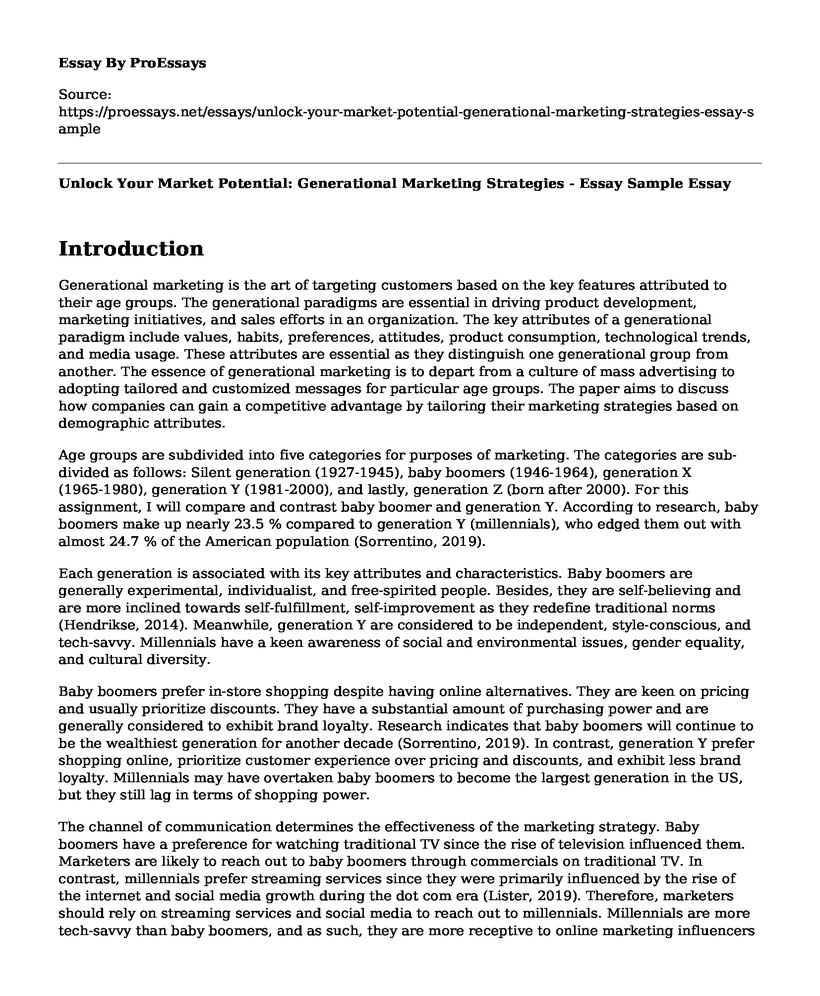Introduction
Generational marketing is the art of targeting customers based on the key features attributed to their age groups. The generational paradigms are essential in driving product development, marketing initiatives, and sales efforts in an organization. The key attributes of a generational paradigm include values, habits, preferences, attitudes, product consumption, technological trends, and media usage. These attributes are essential as they distinguish one generational group from another. The essence of generational marketing is to depart from a culture of mass advertising to adopting tailored and customized messages for particular age groups. The paper aims to discuss how companies can gain a competitive advantage by tailoring their marketing strategies based on demographic attributes.
Age groups are subdivided into five categories for purposes of marketing. The categories are sub-divided as follows: Silent generation (1927-1945), baby boomers (1946-1964), generation X (1965-1980), generation Y (1981-2000), and lastly, generation Z (born after 2000). For this assignment, I will compare and contrast baby boomer and generation Y. According to research, baby boomers make up nearly 23.5 % compared to generation Y (millennials), who edged them out with almost 24.7 % of the American population (Sorrentino, 2019).
Each generation is associated with its key attributes and characteristics. Baby boomers are generally experimental, individualist, and free-spirited people. Besides, they are self-believing and are more inclined towards self-fulfillment, self-improvement as they redefine traditional norms (Hendrikse, 2014). Meanwhile, generation Y are considered to be independent, style-conscious, and tech-savvy. Millennials have a keen awareness of social and environmental issues, gender equality, and cultural diversity.
Baby boomers prefer in-store shopping despite having online alternatives. They are keen on pricing and usually prioritize discounts. They have a substantial amount of purchasing power and are generally considered to exhibit brand loyalty. Research indicates that baby boomers will continue to be the wealthiest generation for another decade (Sorrentino, 2019). In contrast, generation Y prefer shopping online, prioritize customer experience over pricing and discounts, and exhibit less brand loyalty. Millennials may have overtaken baby boomers to become the largest generation in the US, but they still lag in terms of shopping power.
The channel of communication determines the effectiveness of the marketing strategy. Baby boomers have a preference for watching traditional TV since the rise of television influenced them. Marketers are likely to reach out to baby boomers through commercials on traditional TV. In contrast, millennials prefer streaming services since they were primarily influenced by the rise of the internet and social media growth during the dot com era (Lister, 2019). Therefore, marketers should rely on streaming services and social media to reach out to millennials. Millennials are more tech-savvy than baby boomers, and as such, they are more receptive to online marketing influencers than any other generation group (Lister, 2019). The marketing strategies are age-specific, and as such, the process of selling to younger generations changes when they become older. As people age, their preferences are bound to change as well, and thus marketers should also devise age-appropriate marketing strategies.
Conclusion
In conclusion, generational marketing enables companies to address the needs of individual consumers better, thus strengthening their brand image. Organizations need to focus on appealing the right audience by tailoring their marketing campaign according to the demographic attributes. The two generations have different preferences, and thus understanding industry nuances will enable organizations to cater to their differing needs.
References
Hendrikse, S. (2014). Generational Marketing and the Millennial Mindset. Retrieved from https://www.mightycall.com/blog/generational-marketing/
Lister, M. (2019). Generational Marketing: How to Target Millennials, Gen X, & Boomers. Retrieved from https://www.wordstream.com/blog/ws/2016/09/28/generational-marketing-tactics
Sorrentino, D. (2019). The XYZs of generational marketing. Retrieved from https://www.brafton.com/blog/content-marketing/the-xyzs-of-generational-marketing/
Cite this page
Unlock Your Market Potential: Generational Marketing Strategies - Essay Sample. (2023, Mar 30). Retrieved from https://proessays.net/essays/unlock-your-market-potential-generational-marketing-strategies-essay-sample
If you are the original author of this essay and no longer wish to have it published on the ProEssays website, please click below to request its removal:
- Essay Sample on Ethnography About People Behavior in Grocery Store
- Dunkin' Donuts Analysis Paper Example
- Essay Sample on Starbucks' Internal Environment
- Understanding Purchaser Behaviour: The Essentials of Promotion
- OCB: Behavior Beyond the Job Description for Optimal Organizational Efficiency - Essay Sample
- Essay on AI for Marketers: Unlocking New Market Fundamentals & Predicting Fluctuations
- Report Sample: Technology and Management Improvement for Third Star Financing







